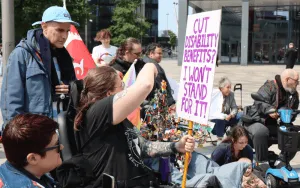
The Department for Work and Pensions (DWP) admitted to Disability News Service (DNS) last month that it had carried out 60 secret reviews into benefit-related deaths since February 2012.
DNS subsequently put in a new request, also under the Freedom of Information Act (FoIA), to ask for the summaries, conclusions or recommendations of those 60 reviews, minus any information that would identify each claimant.
DNS also asked to be told whether DWP had implemented each of the recommendations from these reviews.
But this week, DWP’s freedom of information team told DNS that it needed a further month to consider the request, under section 36 of FoIA.
Section 36 is designed to protect information when its disclosure would be likely to prejudice “the maintenance of the convention of the collective responsibility” of ministers; inhibit the “free and frank provision of advice”, or the exchange of views, for the purposes of deliberation; or would be likely to prejudice the “effective conduct of public affairs”.
The team said the extra time was needed to “make a determination as to the public interest” of releasing the information.
Coalition ministers have consistently denied any connection between their welfare reforms and cuts and the deaths of benefit claimants.
But there have been numerous reports of disabled people whose deaths have been linked by relatives and friends to the employment and support allowance (ESA) claim process, the refusal or removal of ESA and other benefits, and the DWP’s use of sanctions to temporarily remove benefits from a claimant.
Among them are the deaths of David Clapson and Mark Wood.
Clapson, who had diabetes, had his benefits stopped because he missed two DWP appointments.
He died through an acute lack of insulin. His electricity had been cut off, so the fridge where he kept his insulin was not working.
An autopsy found his stomach was empty at the time of his death. He had just £3.44 in his bank account and there was almost no food left in the flat.
Wood starved to death after being found fit for work and having his ESA and housing benefit removed.
Disabled activists who believe that the government’s cuts and welfare reforms have led to the deaths of benefit claimants were appalled by the DWP response.
Bob Ellard, a member of the steering group of Disabled People Against Cuts, said: “It doesn’t get more serious than this.
“If the publication of information about the deaths of 60 claimants, possibly as a direct result of welfare reform, is not in the public interest, then what is?
“It must be in the public interest to know whether our government is implementing welfare policies, in the knowledge that these ‘reforms’ are killing disabled people.
“The DWP cannot be allowed to continue stonewalling on this. We urgently need an independent inquiry into what the DWP knows about the deaths of benefit claimants, otherwise the body count will continue to increase.
“How many more deaths will it take before something is done?”
John McArdle, co-founder of Black Triangle, said: “We are not in the least bit surprised that the DWP is seeking any means at its disposal to cover-up any findings of its investigations into benefit-related deaths.
“These deaths would have been preventable had there been a reporting mechanism built into the system for GPs and other professionals to flag up a substantial risk of harm to a claimant if they were to be found fit for work.”
Representatives of Black Triangle and the sisters of Wood and Clapson will meet leaders of both the British Medical Association and the General Medical Council – a meeting organised by Labour MP John McDonnell – next month to urge them to set up a way for all 55,000 GPs in the UK to report such concerns.
Ian Jones, of the WOWcampaign, said the government appears to “be willing to stop at nothing to keep the consequences of their ‘flagship’ welfare reforms out of the public domain.
“Presumably this is because the British public would lose faith in their government if a causal link was demonstrated between their policies and the premature deaths of countless disabled people.”
And Samuel Miller, a disabled campaigner from Canada, who has played a key role in raising awareness at the UN’s human rights office of the impact of welfare reform in the UK, said he was “not at all surprised that the DWP is doing everything in their power to prevent even a redacted release of the 60 internal reviews”.
He said: “They obviously fear that doing so will invite greater scrutiny of benefit-related deaths, in the form of increased public and media attention.”
He added: “The DWP is resorting to petty obstructionism – even a full-fledged cover-up – because the mortality of the sick and disabled has become too politicized for the Tories to cope with.”
18 December 2014

 This bill opens the door to scandal, abuse and injustice, disabled activists say after assisted dying bill vote
This bill opens the door to scandal, abuse and injustice, disabled activists say after assisted dying bill vote ‘We will not give a single inch,’ disabled activists vow, as Kendall publishes disability cuts bill
‘We will not give a single inch,’ disabled activists vow, as Kendall publishes disability cuts bill Activists consider legal action after DWP cancels only face-to-face benefit cuts consultation event in Wales
Activists consider legal action after DWP cancels only face-to-face benefit cuts consultation event in Wales